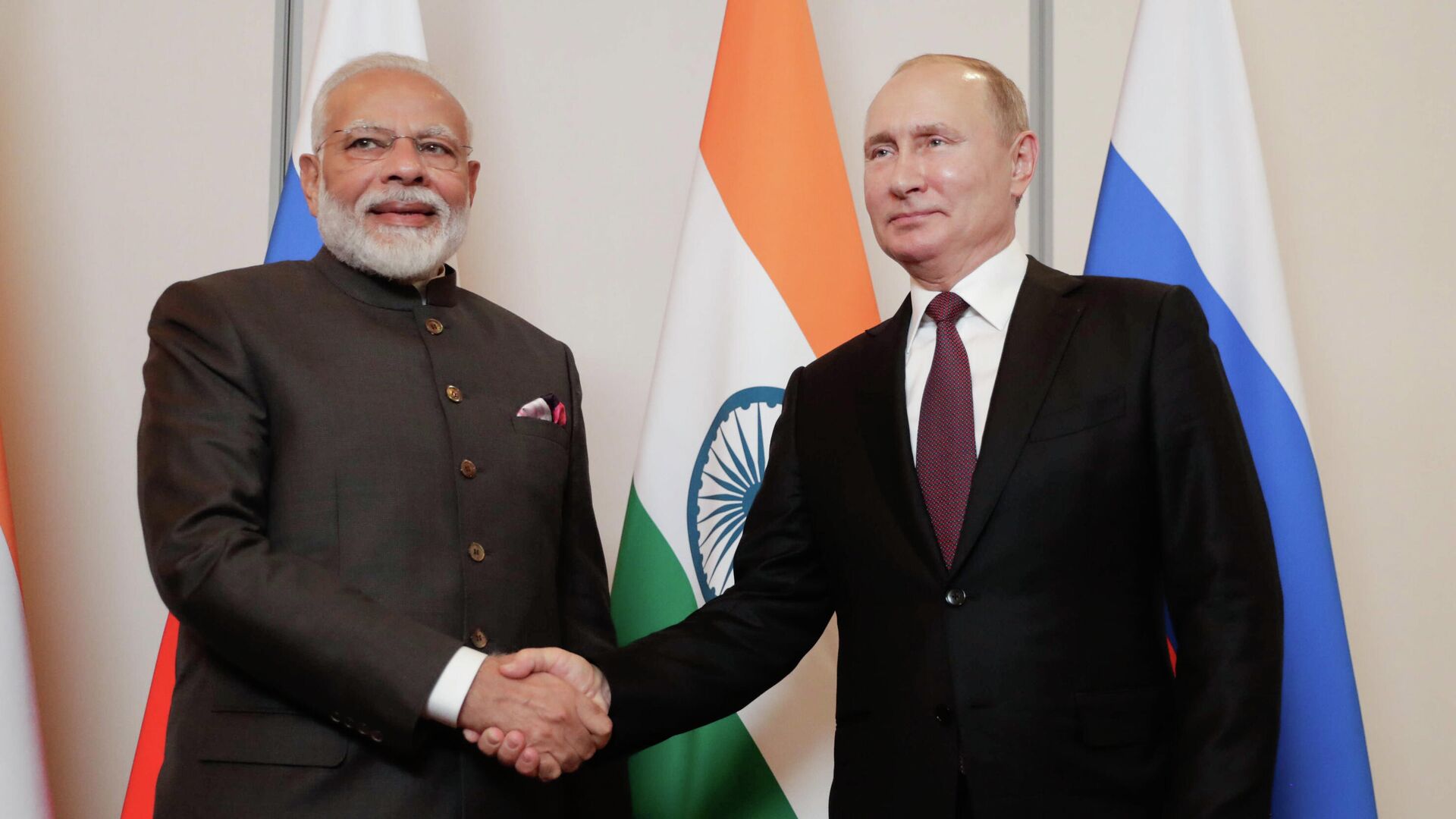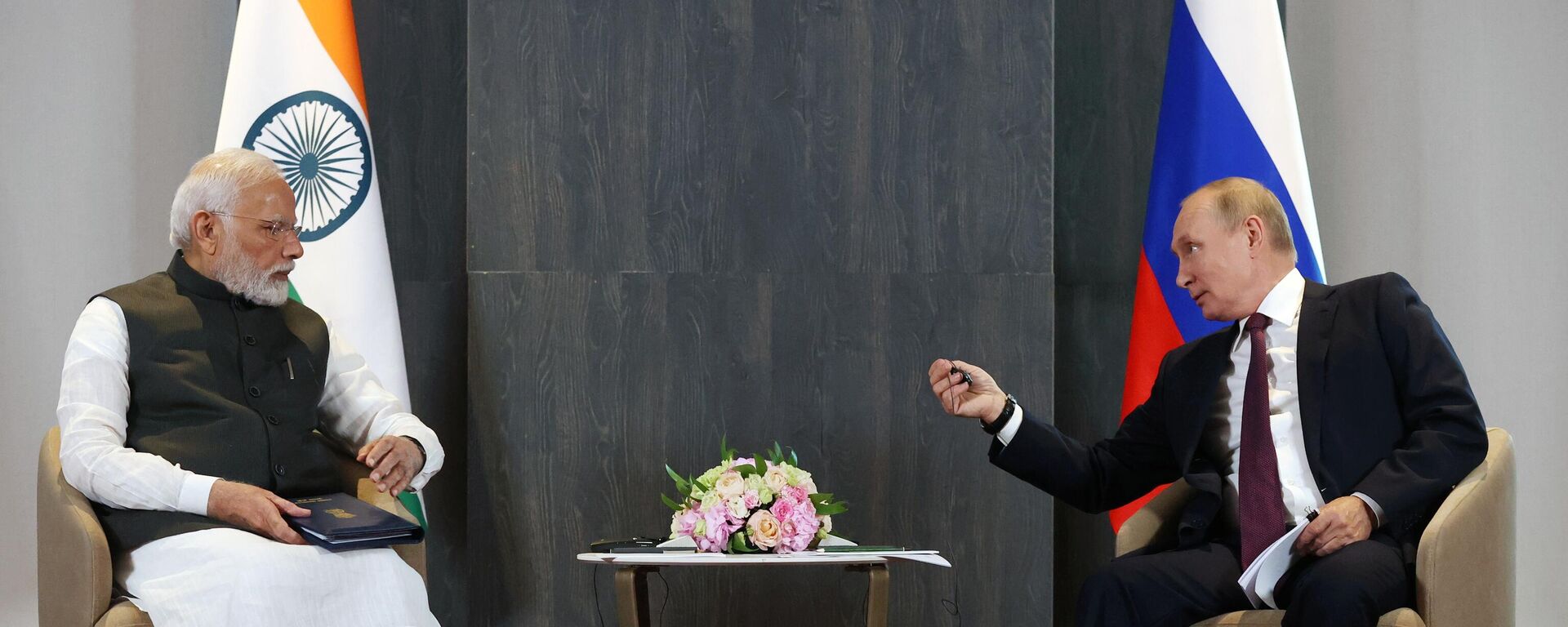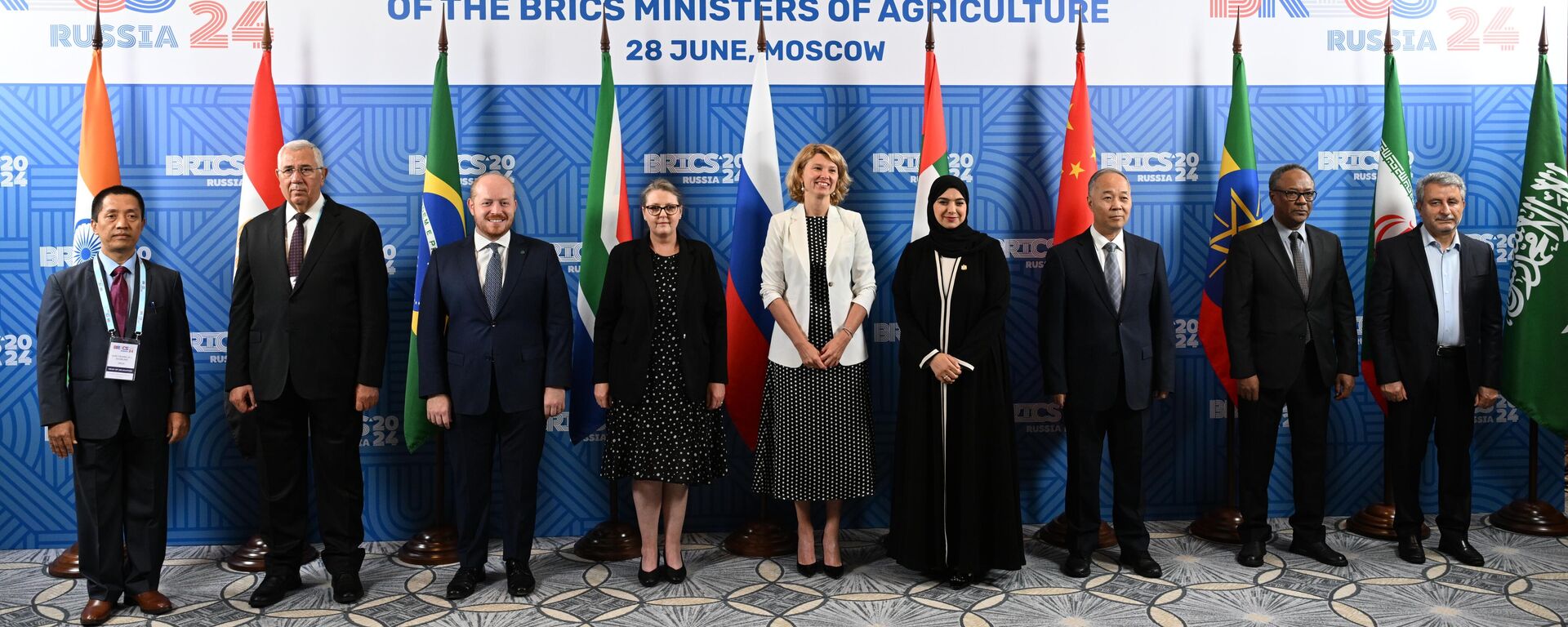https://en.sputniknews.africa/20240708/1067420253.html
Narendra Modi's Trip to Russia: What to Expect?
Narendra Modi's Trip to Russia: What to Expect?
Sputnik Africa
In June, Narendra Modi became India's first prime minister since Jawaharlal Nehru to start a third consecutive term. On July 8-9, Modi will be in Moscow to... 08.07.2024, Sputnik Africa
2024-07-08T07:00+0200
2024-07-08T07:00+0200
2024-07-08T17:44+0200
international
vladimir putin
narendra modi
dmitry peskov
india
moscow
russia
kremlin
united nations (un)
g7
https://cdn1.img.sputniknews.africa/img/07e8/07/08/1067420433_0:0:2960:1665_1920x0_80_0_0_3479f94e7ba7867d281b07c58b9b9241.jpg
Moscow is looking forward to a “very important, full-scale visit, significant for Russian-Indian relations,” the Kremlin underscored ahead of Prime Minister Narendra Modi’s arrival in Moscow."Given the trusting nature of the relationship between President Putin and Prime Minister Modi, we can expect that there will be an exchange of views on all issues that are on the agenda," Kremlin spokesman Dmitry Peskov said in an interview with Russian TV journalist Pavel Zarubin. Regional and global security, along with bilateral trade and economic interaction, will be a focal point, added Peskov.The last time the head of the Indian government was in Russia was in 2019, when he came to the Far East city of Vladivostok. Modi's last trip to Moscow was in 2015. The 21st India-Russia Summit was held in 2021.Russia is a country that remains very important for India's engagement in Eurasia, beyond the overarching bilateral strategic relationship the two sides are developing, Dr. Raj Kumar Sharma, a senior research fellow at NatStrat, a New Delhi-based think tank, told Sputnik.He underscored that the upcoming talks should be viewed through the lens of an extremely promising bilateral context, which allows India and Russia to strengthen their strategic autonomy amid global geopolitical changes.In a geopolitical scenario where NATO continues its proxy war in Ukraine, the Palestinian-Israeli conflict rages unabated, and elections loom in the US, Modi “rightly chose to visit Russia, highlighting the resilience of India-Russia ties amid many geopolitical changes,” he noted.Indeed, for Modi, the trip to Moscow is a demonstration of India's strategic autonomy and his own ambitions as a leader of the non-Western world. For Putin, the talks fall in line with a succession of recent meetings with leaders of the Global South, symbolizing the pivot towards a new world order.Agenda of Modi’s Visit to MoscowModi will arrive in Moscow on Monday afternoon and will be welcomed with a private dinner hosted by the Russian president. This will be followed by formal summit discussions, highlighting the personal rapport between the two leaders, said India’s Foreign Secretary Vinay Kwatra.On Tuesday, Modi will meet with the Indian community in Moscow. After this, the Indian PM will lay a wreath at the Tomb of the Unknown Soldier in the Kremlin and visit the RUSSIA EXPO exhibition venue in Moscow.The core of the visit will be bilateral talks between Putin and Modi. They will first be held in a “restricted-level” format, to be followed by broader, delegation-level talks.Key Topics on the TableThe two leaders will review the entire range of multi-faceted ties between their countries, said Indian Foreign Secretary Vinay Kwatra, as he spelled out to journalists the likely agenda of Modi’s discussions with Putin.The summit will offer an opportunity for the two leaders "to review the whole range of bilateral issues, including defense, trade, investment, energy cooperation, science and technology, education, culture and people-to-people exchanges among others," Kwatra noted at a briefing in New Delhi. The senior diplomat hailed the fact that the "special privileged strategic partnership" between the two countries has remained "resilient in the wake of multiple geopolitical challenges."Modi and Putin are expected to “share perspectives on regional and global developments of mutual interest and also assess the status of bilateral engagements in groupings such as BRICS, the Shanghai Cooperation Organization, G20, the East Asia Summit (EAS), and the United Nations (UN)," Kwatra stated.India is hoping to boost its exports, Kwatra said, adding:The foreign secretary underscored that investment ties between the two nations have also been growing, including in energy, banking, railways, and steel. A sustainable payment mechanism amid the de-dollarization drive is also to be discussed.The foreign secretary stated that enhancing cooperation on projects such as the International North-South Transport Corridor (INSTC), Chennai-Vladivostok Maritime Corridor and Chabahar Port is expected to figure prominently in talks between Modi and Putin.Indeed, this June, Russia for the first time sent two trains laden with coal to India via the International North-South Transport Corridor, reminded Dr. Raj Kumar Sharma.Dr. Sharma also mentioned that in South Asia, Sri Lanka will shortly hand over management of its Chinese-built Mattala International Airport in Hambantota to a joint India-Russia venture.When asked about the West’s sanctions targeting Russia, he noted that New Delhi has been careful to adhere to UN sanctions, but where the G7 sanctions are concerned, “we have been very regularly in touch with the G7, essentially to protect and progress our national interest and our national needs when it comes to our economic and political interests.”After the start of Russia’s special military operation in Ukraine, Western countries greatly reduced their purchases of Russian oil and gas in a move that was intended, but failed, to cripple the Russian economy. India, however, has seen its imports of Russian oil soar. The country’s imports of Russian oil grew tenfold in just 2023.It was reported in May that India’s largest private corporation, Reliance Industries, and the Russian energy company Rosneft signed a one-year agreement for up to three million barrels of oil per month that will be paid in Russian rubles. This is part of the drive towards ditching the US dollar’s hegemony.State nuclear agency Rosatom and its Indian counterpart are also negotiating a potential partnership in scientific and technological fields such as quantum computing, communications, and quantum sensors, according to Rosatom head Alexey Likhachev.The leaders will also discuss cooperation between India and Russia in the Russian Far East, which is the main focus of the "Act Far East" policy announced by Modi in 2019.Russia remains India's main weapons supplier, accounting for 36% of its arms imports. The two sides keep implementing defense industry projects focused on technological cooperation. Furthermore, at the Moscow summit, the sides are likely to sign a long-awaited Russia-India mutual logistics agreement.The Reciprocal Exchange of Logistics Agreement is designed to enhance military cooperation between the two nations by streamlining military logistics support.Applicable during both wartime and peacetime missions, it will:Russia and India likewise hope to implement mutual visa-free travel by the end of 2024. India is reportedly planning to announce the opening of two more consulates in Russia.After the conclusion of the Russia-India summit in Moscow, the two countries intend to announce a series of documents that have been prepared for Modi's visit to Moscow, according to Kwatra.
https://en.sputniknews.africa/20240706/putin-modi-to-hold-talks-in-narrow-expanded-formats-during-indian-leader-visit-kremlin-says-1067402551.html
https://en.sputniknews.africa/20240628/russia-to-work-with-brics-countries-on-settlements-in-local-currencies-creation-of-grain-exchange-1067287401.html
india
moscow
russia
asia
Sputnik Africa
feedback@sputniknews.com
+74956456601
MIA „Rossiya Segodnya“
2024
News
en_EN
Sputnik Africa
feedback@sputniknews.com
+74956456601
MIA „Rossiya Segodnya“
Sputnik Africa
feedback@sputniknews.com
+74956456601
MIA „Rossiya Segodnya“
international, vladimir putin, narendra modi, dmitry peskov, india, moscow, russia, kremlin, united nations (un), g7, ruble, asia
international, vladimir putin, narendra modi, dmitry peskov, india, moscow, russia, kremlin, united nations (un), g7, ruble, asia
Narendra Modi's Trip to Russia: What to Expect?
07:00 08.07.2024 (Updated: 17:44 08.07.2024) In June, Narendra Modi became India's first prime minister since Jawaharlal Nehru to start a third consecutive term. On July 8-9, Modi will be in Moscow to co-chair the 22nd Russia-India Annual Summit with President Vladimir Putin.
Moscow is looking forward to a “
very important, full-scale visit, significant for Russian-Indian relations,” the Kremlin underscored ahead of Prime Minister Narendra Modi’s
arrival in Moscow.
"Given the trusting nature of the relationship between President Putin and Prime Minister Modi, we can expect that there will be an exchange of views on all issues that are on the agenda," Kremlin spokesman Dmitry Peskov said in an interview with Russian TV journalist Pavel Zarubin. Regional and global security, along with bilateral trade and economic interaction, will be a focal point, added Peskov.
The last time the head of the Indian government was in Russia was in 2019, when he came to the Far East city of Vladivostok. Modi's last trip to Moscow was in 2015. The 21st India-Russia Summit was held in 2021.
Russia is a country that remains very important for India's engagement in Eurasia, beyond the overarching bilateral strategic relationship the two sides are developing, Dr. Raj Kumar Sharma, a senior research fellow at NatStrat, a New Delhi-based think tank, told Sputnik.
He underscored that the upcoming talks should be viewed through the lens of an extremely promising bilateral context, which allows India and Russia to strengthen their strategic autonomy amid global geopolitical changes.
In a geopolitical scenario where NATO continues its proxy war in Ukraine, the Palestinian-Israeli conflict rages unabated, and elections loom in the US, Modi “rightly chose to visit Russia, highlighting the resilience of India-Russia ties amid many geopolitical changes,” he noted.
Indeed, for Modi, the trip to Moscow is a demonstration of India's strategic autonomy and his own ambitions as a leader of the non-Western world. For Putin, the talks fall in line with a succession of recent meetings with leaders of the Global South, symbolizing the pivot towards a new world order.
Agenda of Modi’s Visit to Moscow
Modi will arrive in Moscow on Monday afternoon and will be welcomed with a private dinner hosted by the Russian president. This will be followed by formal summit discussions, highlighting the personal rapport between the two leaders, said India’s Foreign Secretary Vinay Kwatra.
On Tuesday, Modi will meet with the Indian community in Moscow. After this, the Indian PM will lay a wreath at the Tomb of the Unknown Soldier in the Kremlin and visit the RUSSIA EXPO exhibition venue in Moscow.
The core of the visit will be bilateral talks between Putin and Modi. They will first be held in a “restricted-level” format, to be followed by broader, delegation-level talks.
The two leaders will review the entire range of multi-faceted ties between their countries, said Indian Foreign Secretary Vinay Kwatra, as he spelled out to journalists the likely agenda of Modi’s discussions with Putin.
The summit will offer an opportunity for the two leaders "to review the whole range of bilateral issues, including defense, trade, investment, energy cooperation, science and technology, education, culture and people-to-people exchanges among others," Kwatra noted at a briefing in New Delhi. The senior diplomat hailed the fact that the "special privileged strategic partnership" between the two countries has remained "resilient in the wake of multiple geopolitical challenges."
Modi and Putin are expected to “share perspectives on regional and global developments of mutual interest and also assess the status of bilateral engagements in groupings such as BRICS, the Shanghai Cooperation Organization, G20, the East Asia Summit (EAS), and the United Nations (UN)," Kwatra stated.
India is hoping to boost its exports, Kwatra said, adding:
"India-Russia bilateral trade has seen a sharp increase in 2023-24. It has since touched close to $65 billion, primarily due to strong energy cooperation between the countries."
The foreign secretary underscored that investment ties between the two nations have also been growing, including in energy, banking, railways, and steel. A sustainable payment mechanism amid the de-dollarization drive is also to be discussed.
"Russia also remains India's important partner for energy security and defense. In the area of nuclear energy, Units I and II of the Kudankulam Nuclear Power Plant (KNPP) have already become operational, and work is progressing on Units III and IV," Kwatra noted.
The foreign secretary stated that enhancing cooperation on projects such as the International North-South Transport Corridor (INSTC), Chennai-Vladivostok Maritime Corridor and Chabahar Port is expected to figure prominently in talks between Modi and Putin.
Indeed, this June, Russia for the first time sent two trains laden with coal to India via the International North-South Transport Corridor, reminded Dr. Raj Kumar Sharma.
Dr. Sharma also mentioned that in South Asia, Sri Lanka will shortly hand over management of its
Chinese-built Mattala International Airport in Hambantota to a joint India-Russia venture.
When asked about the West’s sanctions targeting Russia, he noted that New Delhi has been careful to adhere to UN sanctions, but where the G7 sanctions are concerned, “we have been very regularly in touch with the G7, essentially to protect and progress our national interest and our national needs when it comes to our economic and political interests.”
After the start of Russia’s special military operation in Ukraine, Western countries greatly reduced their purchases of Russian oil and gas in a move that was intended, but failed, to cripple the Russian economy. India, however, has seen its imports of Russian oil soar. The country’s imports of Russian oil grew tenfold in just 2023.
It was reported in May that India’s largest private corporation, Reliance Industries, and the Russian energy company Rosneft signed a one-year agreement for up to three million barrels of oil per month that will be paid in Russian rubles. This is part of the drive towards ditching the US dollar’s hegemony.
State nuclear agency Rosatom and its Indian counterpart are also negotiating a potential partnership in scientific and technological fields such as quantum computing, communications, and quantum sensors, according to Rosatom head Alexey Likhachev.
The leaders will also discuss cooperation between India and Russia in the Russian Far East, which is the main focus of the "Act Far East" policy announced by Modi in 2019.
Russia remains India's main weapons supplier, accounting for 36% of its arms imports. The two sides keep implementing defense industry projects focused on technological cooperation. Furthermore, at the Moscow summit, the sides are likely to sign a long-awaited Russia-India mutual logistics agreement.
The Reciprocal Exchange of Logistics Agreement is designed to enhance military cooperation between the two nations by streamlining military logistics support.
Applicable during both wartime and peacetime missions, it will:
Facilitate replenishment of essential supplies (fuel, rations, spare parts) to enable a continuous military presence in crucial regions;
Provide berthing facilities (for troops, warships, aircraft);
Offer India more expanded maritime outreach, including to the Arctic.
Balance India's logistics agreements with Quad countries while strengthening Russia’s presence in the Indo-Pacific.
Russia and India likewise hope to implement mutual visa-free travel by the end of 2024. India is reportedly planning to announce the opening of two more consulates in Russia.
After the conclusion of the Russia-India summit in Moscow, the two countries intend to announce a series of documents that have been prepared for Modi's visit to Moscow, according to Kwatra.



